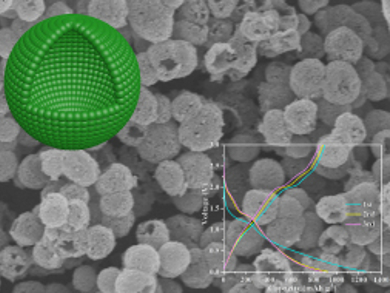Lithium-ion batteries are used in wide-ranging applications, e.g., cell phones, laptops, electric vehicles, and airplanes. Demand is ever-increasing, and there is a constant effort to improve all the components of the battery, such as anode, cathode, and electrolyte, to give higher capacities and longer lifetimes.
Zhen Fang and colleagues, Anhui Normal University, Wuhu, China, have investigated novel anode materials for lithium-ion batteries. Cobalt sulfides are promising materials, but show poor cycling performance when used alone. The team has overcome this limitation by embedding particles of Co9S8 in hollow carbon spheres to improve the material’s properties.
The use of this hybrid system stops the degradation of the sulfide, which prevented its long-term use. A high rate capacity of 784 mAh g–1 was achieved and retained for over 400 cycles. This surpasses the theoretical capacity of 544 mAh g–1 for pure Co9S8. The researchers have also demonstrated the wider applicability of their method in transition metal sulfide hybrids by synthesizing both ZnS and Cu2S hybridized with the carbon spheres.
- In-situ formation of Co9S8/N-C hollow nanospheres by pyrolysis and sulfurization of ZIF-67 for high performance lithium-ion batteries,
Peiyuan Zeng, jianwen Li, Ming Ye, Kaifeng Zhuo, Zhen Fang,
Chem. Eur. J. 2017.
DOI: 10.1002/chem.201700881


